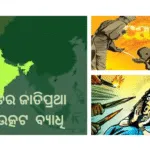On March 26, 2025, 43 tribal families from Pokharia village under Purunapani Panchayat in Rairangpur block of Mayurbhanj district were displaced using bulldozers, allegedly violating provisions of Scheduled Areas, PESA Act, and Gram Sabha rights. It may be recalled here that these villages are part of Mayurbhanj district known as the home district of President of India Smt. Draupadi Murmu. The area is also close to Keonjhar, the home district of Odisha CM Sri. Mohan Charan Majhi.
Following a fact-finding investigation, a case (OHRC 1229/2025) was filed by Prafulla Samantara, Narendra Mahanti, and Sandeep Pattnaik, led by noted human rights activist and lawyer Bishwapriya Kanungo. Upon reviewing the case, Justice Satrughna Pujahari, Chairperson of the Odisha Human Rights Commission, directed the Mayurbhanj District Collector to provide temporary housing and basic amenities to the displaced families and submit a fact-based report by May 9.
The complaint highlights that while the government is urging citizens not to step outside after 11 AM due to intense heatwaves, the elderly, women, and children of these families, who had been residing in the village for over 40 years, were evicted from their homes and left in the open on March 26. The bulldozing of homes held by the tribal people for decades was carried out without due legal procedure, violating multiple government regulations.
The 43 families had been residing in that land for about 40 years and were provided with amenities such as drinking water, electricity, and housing under schemes like Indira Awas Yojana and PMAY. However, the land they lived on was categorized as “grazing land.” For the expansion of the Dandabosh airstrip, a Gram Sabha was supposed to be held on March 8, with notice issued through the village Sarpanch on March 4. The villagers, being part of the Santali tribal community, were celebrating the Surul Parab festival and had requested a 15-day extension to hold the Gram Sabha. This request was ignored, and the Gram Sabha was neither held nor postponed.
On March 4, Dam Hansda, son of Sangram Hansda, was issued a notice under Section 9 (Form K) of the Odisha Prevention of Land Encroachment Act, 1972, and fined. On March 13, officials disconnected the electricity to their homes. Another notice was issued on March 18 under Section 6(1) (Form G) of the same Act, giving residents 30 days to vacate or face eviction. However, before the notice period ended, armed police and revenue officials arrived on March 20 to evict them but retreated due to public resistance.
Later, on March 24, a public announcement was made asking residents to vacate by the evening of March 25. Finally, on March 26 at around 11 AM, with the presence of three platoons of police and the Tehsildar, all houses were demolished using bulldozers. Each family was handed a plastic sheet for shelter.
This action violated legal mandates that prohibit any developmental work in Scheduled Areas without Gram Sabha approval. No opportunity was given to the affected individuals or groups to present their case. Houses and belongings worth lakhs, built with hard-earned money, were destroyed in the name of development, despite these people residing there for four decades.
If land acquisition for the airstrip expansion was required, proper Gram Sabha approval, compensation, and rehabilitation could have been pursued. However, instead of giving a 30-day eviction notice, the administration forcefully evicted them within eight days, clearly violating government norms and the human rights of 43 tribal families through “bulldozer rule.”
The senior Team of leading activists and human rights defenders in Odisha have therefore demanded before the government and also in their appeal to Chairman, OHRC that:
- Immediate compensation and government-assisted reconstruction of demolished homes should be provided to the displaced families.
- A Gram Sabha should be held immediately and further actions taken based on its decisions.
- Disciplinary action should be initiated against government officials responsible for violating PESA laws, Scheduled Area protections, and causing this humanitarian crisis.
Though the OHRC has engaged the DM and Collector of Mayurbhanj for resolving the issue, the inhuman treatment that these 43 families received does speak volumes about the state of tribal life in Odisha in spite of having protective legislations like PESA 1996 and Forest Rights Act 2006. Though distinguished members of the tribal comminutes are occupying now the highest positions in the country and in the State, it hardly makes any difference to the life of ordinary tribal community members.
*(Shri Bighneswar Sahu is a Senior Journalist who has worked with major newspapers in Odisha and is leading the news fortnightly the Samadrusti now. He acknowledges the inputs he received from the Team that visited the affected area)
Comments
0 comments






